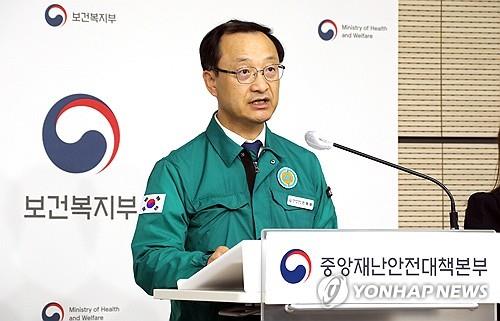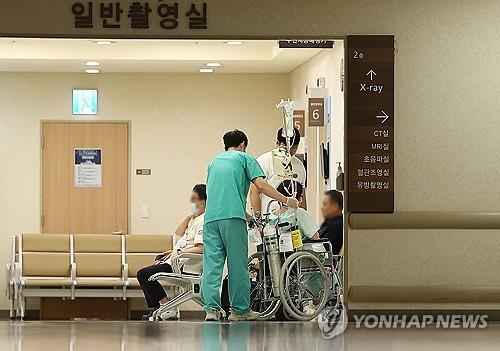- California Assembly OKs highest minimum wage in nation
- S. Korea unveils first graphic cigarette warnings
- US joins with South Korea, Japan in bid to deter North Korea
- LPGA golfer Chun In-gee finally back in action
- S. Korea won’t be top seed in final World Cup qualification round
- US men’s soccer misses 2nd straight Olympics
- US back on track in qualifying with 4-0 win over Guatemala
- High-intensity workout injuries spawn cottage industry
- CDC expands range of Zika mosquitoes into parts of Northeast
- Who knew? ‘The Walking Dead’ is helping families connect
Gov’t reviewing accepting resignations by trainee doctors; warns of action against possible strike by community doctors
The health ministry said Monday it will actively review accepting resignations by striking doctors to allow them to seek other career paths, while devising ways of minimizing disadvantages to returnees.
The ministry, however, warned of “necessary responses” to a possible strike by community doctors amid growing concerns that the move would further disrupt the country’s medical system due to the monthslong walkout by junior doctors.
“The government is actively considering accepting doctors’ resignations after taking into consideration opinions by chiefs of training hospitals and striking doctors,” Deputy Health Minister Jun Byung-wang told a press briefing.
Around 12,000 trainee doctors have remained off the job in the form of mass resignations since late February in protest of the government’s decision to raise the medical school admissions quota by 2,000, even though the government issued an order to return to work.
It also ordered training hospitals not to accept their resignations, but the doctors and their hospitals have called for lifting the orders “as a path of retreat” now that the government finalized next year’s admission plan reflecting the quota increase.
If the orders are lifted, trainee doctors would be able to choose one of at least two options of serving as a general doctor at other medical clinics rather than teaching hospitals or returning to where they initially worked for.
“Hospital chiefs have said they can actively, and more easily, persuade trainee doctors to return to work if the government withdraws the orders,” Jun said. “We are also discussing how to minimize disadvantages to returning doctors. All the details will be announced soon.”

Despite the protest, the government effectively finalized the quota late last month, with the Korean Council for University Education confirming next year’s admissions plan, marking the first such increase in 27 years.
In response, the Korea Medical Association, the largest doctors’ organization, held candlelight vigils last week and warned of a large-scale protest against the reform plan this month.
The association plans to vote this week on whether to carry out a strike, including doctors at local clinics, according to media reports.
“If the medical community proceeds with a vote on a collective strike and files lawsuits against university presidents, it will only spark endless tension and discord,” Health Minister Cho Kyoo-hong told a government response meeting.

Cho added that the government plans to hold the annual medical exam on schedule this year, despite demands for a delay from medical students who have also walked out of classrooms in solidarity with the junior doctors.
“The government plans to notify the schedule on Monday and hold the exam on Sept. 2,” the health minister said.
There have been looming concerns that delays in the supply of new doctors could trigger a domino effect, disrupting the availability of military and public health doctors as well.
Cho also noted that the government will make efforts to minimize penalties on junior doctors returning to their worksites.
“We plan to minimize disadvantages for the returning junior doctors and make efforts to improve their training environment,” Cho said.









![배우 김민희와 홍상수 감독[스타뉴스]](http://www.koreatimesus.com/wp-content/uploads/2025/04/20250408101705671-120x134.jpg)

